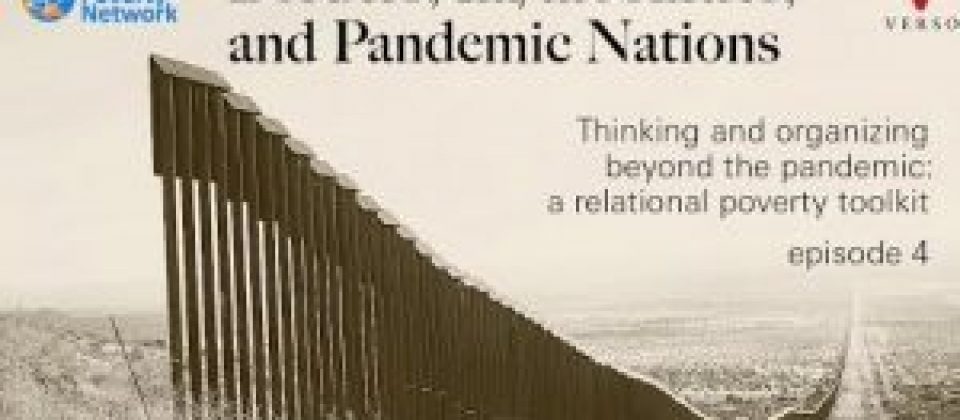Description
A virtual teach-in with speakers from Australia, Iraq, Mexico, the United Kingdom, and the United States on borders and the politics of mobility.
This is the fourth instalment in a four-part teach-in series, co-sponsored by Verso Books and the Relational Poverty Network, entitled Thinking and organising beyond the pandemic, a relational poverty toolkit.
————-
Contagion renders our social and spatial mobility the object of heightened surveillance and constraint, yet it also intensifies our dependence on that very mobility—including on migrants’ labor, crucial to essential industries. Amid calls to “stay at home!” and “go home!” borders, nations, and sovereignty are reasserted in myriad ways, from anti-Asian harassment to exhortations to prove one’s economic value or leave, stepped-up detention regimes, and the unequal risks born by Indigenous peoples, people of color, and others excluded from national belonging or entitlements. Meanwhile, new forms of solidarity and visibility emerge, such as organized labor campaigns for undocumented workers and seasonal guest workers. Panelists from Australia, Iraq, Mexico, the United Kingdom, and the United States, ask: What kinds of borders are intensified in the pandemic? What forms of nationhood and sovereignty eroded or (re)asserted? What regimes of citizenship or confinement arise? How do they amplify vulnerability or solidarity for people who inhabit various borderlands?
Speakers:
Manoj Dias-Abey is a labor law lecturer at the University of Bristol; his research explores work, migration, political economy, covering three themes: how labor organizations and movements that represent migrant workers utilize the law; temporary labor migration programs; and how social movements devise innovative forms of regulation for global value chains.
Victoria Stead is an anthropologist who writes about labor and (post)colonial relations, and is currently working with Pacific Islander temporary migrants and other farmworkers in Australia’s horticultural industry. She is the author of Becoming Landowners: Entanglements of Custom and Modernity in Papua New Guinea and Timor-Leste.
Teresa Mares is an Associate Professor of Anthropology at the University of Vermont. Her research focuses on the intersection of food and migration studies, and particularly the ways that the diets and foodways of Latino/a immigrants change as a result of migration. She is the author of Life on the Other Border: Farmworkers and Food Justice in Vermont (UC Press, 2019).
Maru Mora Villalpando is a community organizer, writer, and undocumented immigrant mother. Born and raised in Mexico City, she has spent many years focusing on racial justice and immigrant rights in the United States. She is a co-founder of La Resistencia, organizing to shut down the Northwest Detention Center in Tacoma. She has contributed to Truthout, Yes! magazine, Al Jazeera, El Tribuno del Pueblo, Law at the Margins, and other publications.
Roj Amedi, a writer, strategist and human rights advocate passionate about design, contemporary art, and access to justice. Since migrating to Australia as an Iraqi-Kurdish refugee, Roj has campaigned for refugee, migrant, and LGBTIQ+ rights with organisations such as GetUp!, Colour Code and Justice Connect. Her life’s work is economic and racial justice.
Sanmati Verma is an Accredited Specialist in Immigration Law, and has practiced in the area of migration law for a decade. She has worked with the New Delhi-based Commonwealth Human Rights Initiative and established the International Student Legal Advice Clinic at the Western Suburbs Legal Service. Sanmati also conducts regular community legal education and training seminars in refugee and migration law. She is a member of the Law Institute of Victoria’s “Legacy Caseload Working Group” and was previously the chair of the Refugee Law Reform Committee. She was nominated for the Law Council of Australia’s award for Young Migration Lawyer of the Year in 2014 and 2015, and awarded the Law Institute of Victoria’s award for “Emerging Lawyer of the Year” in 2016.
The Relational Poverty Network convenes an international community of scholars, teachers, policy makers, and activists working within and beyond academia to develop conceptual frameworks, research methodologies, and pedagogies that shift from thinking about “the poor and poor others” to relationships of power and privilege. They work across boundaries to foster a transnational, comparative and interdisciplinary approach to poverty research that involves multidirectional theory building and incorporates marginalized voices to build innovative concepts for poverty research.


Leave a Reply